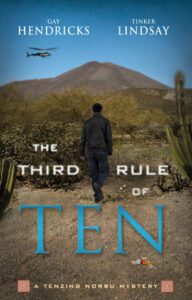Home »

A different offering in the mystery genre
Book Review
By Derryll White
Hendricks, Gay and Tinker Lindsay (2014). The Third Rule of Ten.
Tenzing ‘Ten’ Norbu may be the most interesting PI in modern crime fiction.’ – Robert Ferrigno
 The above is high praise from a writer who is himself a very versatile and strong master in this genre. This is definitely a different offering in the mystery genre. Tenzing Norbu – ‘Ten’ – is a Los Angeles detective with roots in Dharamshala, Tibet. He is, in short, a Buddhist action figure unlike any other P.I. The reader swings delectably between the high bars of meditative calm and the base notes of cartel destruction.
The above is high praise from a writer who is himself a very versatile and strong master in this genre. This is definitely a different offering in the mystery genre. Tenzing Norbu – ‘Ten’ – is a Los Angeles detective with roots in Dharamshala, Tibet. He is, in short, a Buddhist action figure unlike any other P.I. The reader swings delectably between the high bars of meditative calm and the base notes of cartel destruction.
The authors blend the worlds in an intriguing fashion with Ten sometimes getting instruction from his childhood friends, now head abbots in Dharamshala. The way the action flows, melding violent death with the practice of ahimsa – doing no harm to any and all sentient beings – gives the reader pause, and a desire for personal reflection. This is definitely a different reading experience and appealing because of that fact.
There are strong insights into the sad state of immigrant affairs in the United States, and the heavy hand of federal authority. Hendricks and Lindsay also delve into the workings of the cartels and hint at unexplainable powers beyond the rational realm. They bring in many things to ponder but they also propose a radically different way of thinking, based in Buddhism. All-in-all this is an exciting and well-written adventure off the beaten path.
********
Excerpts from the novel:
 WRITING – But my retreat from communication had little to do with computer networks. When I had written them letters in the past, the simple act of putting pen to paper meant I was willing to connect with my feelings and listen to my heart.
WRITING – But my retreat from communication had little to do with computer networks. When I had written them letters in the past, the simple act of putting pen to paper meant I was willing to connect with my feelings and listen to my heart.
PRIVACY – A man deserves his privacy. My recent stay at the monastery had reminded me again how precious privacy can be. The total lack of it had been one of the factors that drove me away from the monastic life to begin with. But as my tutor, Lama Sonam, once told me, after catching me fibbing about some escapade or other, practicing noble speech and action requires constant vigilance, and there’s a fine line between privacy and secrecy. One creates healthy boundaries, he said; the other unhealthy walls. One illustrates, the other isolates. One is about honoring one’s self; the other dishonors one’s connections to others.
DOGS & CATS – I pondered the different ways cats and dogs – not to mention their deluded owners – handle affection. If you’re a dog owner, you pay a little attention to your dog, and the dog thinks you’re doing something miraculously wonderful. It licks, wags, pants and dances in circles. Dog owners accept everything about this deal despite the potential for well-earned ridicule as enablers of vulgar canine toadying.
If you’re a cat owner, the reverse is true: your cat pays a little attention to you, and you think it’s doing you a favor. Cat owners accept everything about this deal, despite the potential for well-deserved ridicule as easy marks, suckered in by cunning slackers who appear, at best, amused, when not subjecting their masters to long periods of feline disregard.
Either way, everybody’s happy.
RELIGION – I looked around. The closed eyes, the carved deities, the flowers and beads, the memorized words of devotion and thanksgiving, the chanting in unison, the hymns of praise – was any of it so different from the Buddhist rites and rituals that defined so much of my early life? Each tribe comes with its own spiritual instructions and safety measures, but all are aimed at assuaging terror around the inevitability of death. The only real difference I could see was that other tribes felt justified in killing their enemies in the name of their beliefs while mine was more likely to immolate itself.
 – Derryll White once wrote books but now chooses to read and write about them. When not reading he writes history for the web at www.basininstitute.org.
– Derryll White once wrote books but now chooses to read and write about them. When not reading he writes history for the web at www.basininstitute.org.







